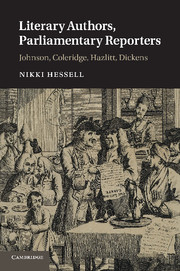Book contents
- Frontmatter
- Contents
- Acknowledgments
- Preface
- Chapter 1 Introduction: reporting and the individual talent
- Chapter 2 Samuel Johnson: beyond Lilliput
- Chapter 3 Samuel Taylor Coleridge and the freedom of the gallery
- Chapter 4 William Hazlitt and the real eloquence of the British Senate
- Chapter 5 Charles Dickens and the ghost of speeches past
- Chapter 6 Conclusion: taking parliamentary reporting seriously
- Bibliography
- Index
Preface
Published online by Cambridge University Press: 05 November 2011
- Frontmatter
- Contents
- Acknowledgments
- Preface
- Chapter 1 Introduction: reporting and the individual talent
- Chapter 2 Samuel Johnson: beyond Lilliput
- Chapter 3 Samuel Taylor Coleridge and the freedom of the gallery
- Chapter 4 William Hazlitt and the real eloquence of the British Senate
- Chapter 5 Charles Dickens and the ghost of speeches past
- Chapter 6 Conclusion: taking parliamentary reporting seriously
- Bibliography
- Index
Summary
Preface
What are reporters? They are the humblest craftsmen in the profession of journalism. They are not the creative writers whose names are known to thousands of readers and whose work is printed over their signatures. They are those who write down patiently the exact words of public men and transmit them faithfully to the channels of publicity. They are anonymous, but indispensible.
William Law, Our Hansard: Or, The True Mirror of Parliament (1950)Parliamentary reporting and literature might seem to have very little in common. As William Law articulates in the epigraph, the distinction between a reporter and an author has traditionally been a catalog of opposites: the humble journalist and the exalted writer, the anonymous craftsman and the literary celebrity, the faithful recorder and the creative genius. Yet there is a small group of parliamentary reporters who were also “known to thousands of readers,” both in their own time and beyond. Some of the most famous, influential and canonical figures in English literature worked in the press gallery during their careers. Samuel Johnson wrote or edited reports for the Gentleman’s Magazine for six years, although he apparently only attended the debates once. Samuel Taylor Coleridge reported for the Morning Post in 1800; William Hazlitt did the same for the Morning Chronicle in 1812 and 1813. Charles Dickens got his start as a shorthand reporter for the Mirror of Parliament in 1831; he would go on to work in the gallery for another five years.
Despite the differences between the writers included in this study, the critical reception of their parliamentary reporting manifests some remarkably consistent themes. Scholarly and biographical work on these authors typically presents parliamentary reporting as a rather unpleasant interlude or stepping stone in their careers, one that is left behind with relief as they rise above its petty demands. This is perhaps unsurprising; there is a sense in which critics – and perhaps readers – want writers to be devoted to literature and to operate beyond the realm of day jobs and wages. We feel for Coleridge, for example, when he writes to a friend that he thinks he might be forced to work in journalism in order to gain those things “yclept BREAD & CHEESE,” and perhaps rejoice when he manages to avoid this fate, even if his reprieve is only temporary. At the same time, the parliamentary reports of these four authors are presented in the existing scholarship as exemplars of the genre that manifest the peculiar strengths of the emergent literary genius, the narrative of such accounts being that if literary figures find themselves forced into Grub Street, they will nevertheless certainly shine.
- Type
- Chapter
- Information
- Literary Authors, Parliamentary ReportersJohnson, Coleridge, Hazlitt, Dickens, pp. ix - xxiiPublisher: Cambridge University PressPrint publication year: 2011



